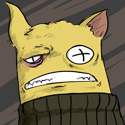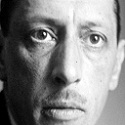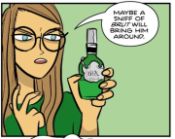|
Charles Dickens was the most popular British novelist of the Victorian period, and his works are still enjoyed today. No, really - they are! Don't let a bad experience with Great Expectations in 9th or 10th grade drive you away from him, because he's a truly great writer. Though his plots can seem saccharine and riddled with coincidences, he has a true gift of creating memorable characters, from Oliver Twist to Ebenezer Scrooge to Miss Havisham. Even Dickens's minor characters are unique and often entertaining. He was also an ardent crusader for the rights of the poor, and many of his stories told of the horrors of the poorhouses, the tenements, and the poorly-run schoolhouses. Having spent time in a debtor's prison as a child, Dickens used his real-life experiences to tell the story of London's underclass. Even after he became rich and famous, he continued to research for his novels and advocate for those less fortunate. His stories came out serially in the magazines and newspapers of the time, and people breathlessly awaited the next chapter of his stories. Reading them today, they can seem a little longwinded - hence the urban legend that he was paid by the word - but they're tremendously fun reads. I've made it a personal project to read all of Dickens's novels, and it's been immensely rewarding. Notable Works: The Pickwick Papers - Dickens's first book, and the one that made him popular. It's not his best, as it mostly consists of a series of unrelated adventures, but there are still fun moments. It follows a gentleman, Mr. Pickwick, as he journeys around the British countryside with his friends Mr. Tupman, Mr. Snodgrass, and Mr. Winkle, along with his manservant Sam Weller. Weller's somewhat the Sancho Panza to Pickwick's Don Quixote, providing most of the humor with witty remarks throughout. A Tale of Two Cities - Probably Dickens's most exciting tale - and one of his shortest novels. It tells the story of a British family swept up in the chaos of the French Revolution. It has one of Dickens's most wicked villains - Madame LeFarge - and boasts his most famous opening line: "It was the best of times, it was the worst of times..." And it has, by far, his most poignant ending. David Copperfield - Dickens's professed favorite, this mostly autobiographical story follows the title character as he grows from a boy who's lost his parents (of course) to a mature and intelligent young man with dreams of writing. It's a wonderful coming-of-age story, telling the story of a young man - usually orphaned or disowned by his family - who goes through hardships until he eventually finds a family (or discovers his lost family had been there all along. (See also: Oliver Twist, Nicholas Nickleby, and Great Expectations.) Bleak House - In the later part of his career, Dickens's plotting became more intricate and complex. Bleak House is the peak of this style, and the Everest of Dickens novels. It follows a byzantine law case, Jarndyce v. Jarndyce, which has been going on for decades. Poor orphan Esther is dragged into this case - as she may have something to do with it, after all - and several plots unwind among dozens of characters. It wouldn't be my recommendation for anyone to start reading Dickens with this, but it's probably my favorite, looking back. The Mystery of Edwin Drood - This was Dickens's final novel, uncompleted at the time of his death. As such, it left the identity of the murderer unknown, and has inspired sequels and wild speculation. I haven't read it yet - I'm saving it for last - but I've heard good things. Other works include Nicholas Nickleby, Great Expectations, Hard Times, Little Dorrit, Dombey & Son, Our Mutual Friend, and a bevy of short stories, one of which is the classic A Christmas Carol. His body of work is wide and well worth a look, especially if you (like me) enjoy 19th century literature.
|
|
|
|

|
| # ? Apr 27, 2024 02:48 |
|
Did you prefer the original or revised ending for Great Expectations? It was original for me, the reconciliation in the revised one was too out of left field to be fitting. The book was more about Pip's obsession with Estella than Estella her self so it was better when he got over her and accepted his fate of being a wizard.
|
|
|
|
It's easy to mock it, but don't forget A Christmas Carol. Our entire modern notion of Christmas as a domestic family holiday basically comes from Dicken's short story. Prior to Dickens, it was mostly a rural holiday celebrated by whole villages, and those celebrations had been banned by the Puritans under Cromwell and broken up as England urbanized. Dickens basically re-imagined the holiday out of whole cloth as a time for everyone to family up together. Dude literally saved Christmas.
|
|
|
|
|
I mentioned it in passing, but you're right that it's one of his major works. I had heard he repopularized Christmas, but didn't know all the details. Regarding Great Expectations, it's been too long since I've read it - it may be the next one I go for, if not Little Dorrit.
|
|
|
|
I've not read many of Dickens novels but I would love to hear what people think of the argument that he writes somewhat one dimensional, cardboard cut out characters. The impression I got from works like Hard Times and Oliver Twist is he does create memorable characters but within all that variety there is predictable sameness. Funny Name + physical quirk or speech impediment + overriding character trait = character. Mr Tumbledown had an amusing lisp and as his name suggests he is a bit of a buffoon, Mr Grably has the catchphrase 'God rest his soul' and as his name suggests he is tight fisted etc. Female characters are angels in the home or mad woman. I've been told off by a friend who said I didn't understand Dickens and need to read his other books to see how wrong I am. I probably have read the wrong Dickens because I can't exactly say that Oliver Twist or Louisa Gradgrind strike me as particularity interesting characters on their own. Who, in people opinions, is his best but also his deepest character?
|
|
|
|
It's damned sad that a high school slog through Great Expectations turns so many people off Dickens. He's a fantastic and really weird writer, and Great Expectations especially is a great, really weird book—Magwitch and the London chase! Jaggers and Wemmick and The Aged! Everything Miss Havisham! Also the original ending is pretty clearly better; it's just ghastly to imagine how miserable Pip's life would have been in the decades after the "happy" ending. Those who haven't should also check out Dickens' close friend, fellow writer, and hardcore laudanum abuser Wilkie Collins, who more or less invented the modern detective novel with The Moonstone, and also wrote tremendous ghost stories and sensation tales too. Dr Scoofles posted:I can't exactly say that Oliver Twist or Louisa Gradgrind strike me as particularity interesting characters on their own. Well, Hard Times is pretty lovely and overly preachy Dickens, so that's one problem right there. Oliver Twist isn't much better. Give a few of the others a try, especially Great Expectations or David Copperfield or really any of them. His characters are definitely "flatter" than those of, say, Virginia Woolf, but they're cut from much finer material than cardboard.
|
|
|
|
As a sidenote, any Dickens aficionado would do well to check out Bleak Expectations. Dickens has permeated English-speaking culture so thoroughly that you can get most of it without ever having cracked open one of his books.
|
|
|
Dr Scoofles posted:I've not read many of Dickens novels but I would love to hear what people think of the argument that he writes somewhat one dimensional, cardboard cut out characters. The impression I got from works like Hard Times and Oliver Twist is he does create memorable characters but within all that variety there is predictable sameness. Funny Name + physical quirk or speech impediment + overriding character trait = character. Mr Tumbledown had an amusing lisp and as his name suggests he is a bit of a buffoon, Mr Grably has the catchphrase 'God rest his soul' and as his name suggests he is tight fisted etc. Female characters are angels in the home or mad woman. I've been told off by a friend who said I didn't understand Dickens and need to read his other books to see how wrong I am. I probably have read the wrong Dickens because I can't exactly say that Oliver Twist or Louisa Gradgrind strike me as particularity interesting characters on their own. Who, in people opinions, is his best but also his deepest character? Dickens wrote a lot of novels and he was writing for a popular audience. I really need to go ahead and buy Nabokov's Lectures on Literature because he talks specifically about Dicken's gift for characterization in his essay on Bleak House. It's not so much his gift for writing complex characters as it is his gift for writing memorable characters that stay alive in the imagination and seem like people you've met or imagine you could have met. That said there really are light-years of difference between his major and minor works. Everyone should try David Copperfield; Dickens was right, it was his best novel. elentar posted:
The Moonstone is one of the best things I've found to recommend to people who have just gotten their first kindle. A free classic they've never heard of. Hieronymous Alloy fucked around with this message at 14:08 on Jul 21, 2014 |
|
|
|
|
Dr Scoofles posted:I've not read many of Dickens novels but I would love to hear what people think of the argument that he writes somewhat one dimensional, cardboard cut out characters. The impression I got from works like Hard Times and Oliver Twist is he does create memorable characters but within all that variety there is predictable sameness. Funny Name + physical quirk or speech impediment + overriding character trait = character. Mr Tumbledown had an amusing lisp and as his name suggests he is a bit of a buffoon, Mr Grably has the catchphrase 'God rest his soul' and as his name suggests he is tight fisted etc. Female characters are angels in the home or mad woman. I've been told off by a friend who said I didn't understand Dickens and need to read his other books to see how wrong I am. I probably have read the wrong Dickens because I can't exactly say that Oliver Twist or Louisa Gradgrind strike me as particularity interesting characters on their own. Who, in people opinions, is his best but also his deepest character? You might like Orwell's essay on Charles Dickens. Great analysis!
|
|
|
|
Hieronymous Alloy posted:Dickens wrote a lot of novels and he was writing for a popular audience. He was also the pioneer of serialization as well and I think that may play a large role in it as well. It is pretty hard to have a complex characters when your having your story read in pieces by a shoe shine boy.
|
|
|
|
I'm fine with "the Jew" being a one dimensional character because its funnier that way.
|
|
|
|
The only Dickens novels I really didn't like were Old Curiosity Shop and Barnaby Rudge. The rest all range from good to great to fantastic. If you're looking for a really well-told story that really works as a unified whole, your best bet is David Copperfield. It's often considered his greatest work, as mentioned by posters above. Bleak House fits here too. If you're looking for a something plotted more like a modern novel, your best bet is Great Expectations, which has some of Dickens' tightest plotting and also features one of his few interesting female characters, Estella. His obsession with writing about the same insipid childlike women he lusted after in real life is really one of his few glaring faults. Tale of Two Cities is also tightly plotted for a Dickens novel, but while it has the best opening and closing lines it is otherwise, in my opinion, not as good a novel, and suffers from the insipid childlike woman disease (there's a semi-childlike woman, Biddy, in Great Expectations, but she's actually kind of kickass, especially for Dickens). If you're looking for hilarious language-based jokes and memorable characterization (which is what you should be looking for in a Dickens novel), go for Pickwick Papers (his funniest work), Nicholas Nickleby, or Dombey and Son. Dombey and Son is often overlooked, and one of my favorites of Dickens' works. The father is hard and mean but somewhat believable and inspires some empathy. And Captain Ned Cuttle is one of my favorite of Dickens' funny sidekicks. "When found make a note of!" If you're looking to get all FIRED UP as Dickens bitches and moans about nasty Americans, read Martin Chuzzlewit.  If you want to see what tumblr would have been like in the mid 1800's London, read Hard Times. If you want a mean Jew, read Oliver Twist. If you want a nice Jew, read Our Mutual Friend. That covers all his full-length novels, I believe. Mystery of Edwin Drood is interesting but unfinished, and the Christmas stories are sort of their own thing.
|
|
|
Lewd Mangabey posted:If you're looking to get all FIRED UP as Dickens bitches and moans about nasty Americans, read Martin Chuzzlewit. Dickens also wrote a nonfiction travelogue about his travels in America which provided the background for Chuzzlewit. It's a mildly interesting read and also free download of course.
|
|
|
|
|
The first half of Oliver Twist is good and funny because Oliver's always doing things, even if they're being forced on him by others, but in the second half he doesn't do anything at all (and vanishes from the book for about a hundred pages) and that's when things really go wrong. The ending is good - Nancy is interesting and not quite a stereotype, and Sykes'/Fagin's/the Dodger's ends are all engrossing - but it hasn't really got anything to do with Oliver. It's like Dickens had no idea what to do with the story. Serialisation!
|
|
|
|
House Louse posted:
Serialisation is the thing! When you're writing a novel to be published as a whole, you can go back and forth through it re-arranging and re-writing things as you see fit, as your work on the novel progresses. With a serialised novel, however, once you've published a chapter, that's it: you can't go back to it and add or delete scenes or references if it becomes necessary later on. That's why the later part of Oliver Twist can come across as disjointed: Dickens found that he was writing himself into a bit of a corner and had to make all the loose ends tie up somehow. If you like Oliver Twist, it's worth understanding just how closely based on reality the book was. Immediately before writing the novel, Dickens had been a journalist, mainly dealing with stories involving the courts. He was very familiar with the London underworld of the 1830's: there's a minor Dickens work: 'Sketches by Boz' (Boz was his journalism nickname) where you can see that he describes from life individuals who later on he evolved into characters in the book. The funniest, I think, is the inspiration for the Artful Dodger: he appears in the 'Criminal Courts' essay.
|
|
|
|

|
| # ? Apr 27, 2024 02:48 |
|
Umiapik posted:Serialisation is the thing! When you're writing a novel to be published as a whole, you can go back and forth through it re-arranging and re-writing things as you see fit, as your work on the novel progresses. With a serialised novel, however, once you've published a chapter, that's it: you can't go back to it and add or delete scenes or references if it becomes necessary later on. That's why the later part of Oliver Twist can come across as disjointed: Dickens found that he was writing himself into a bit of a corner and had to make all the loose ends tie up somehow. I didn't think it was disjointed, but bad in a way a non-serialised novel could easily be - the protagonist turns out to be irrelevant and the villains to be paper tigers. Up until about halfway the novel was full of potential, to me. It was spolit by Dickens' insistence on Oliver's passivity and Monks' absurd capitulation. You remind me of an interview with a comics writer who said that after writing (monthly) comics he re-read Dickens and could see that they used the same techniques to keep the story open to many possible plots. There's something of that in the picaresque structure of the beginning, which pay off when Mr Bumble and Noah Claypole return. And yeah, the Dodger was hilarious, especially his last scene...
|
|
|
















